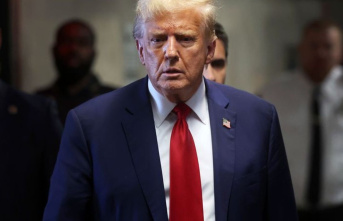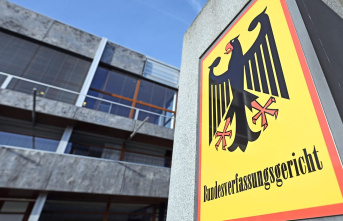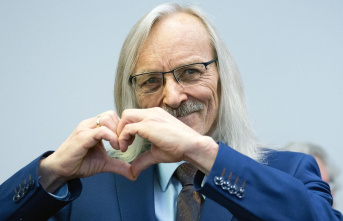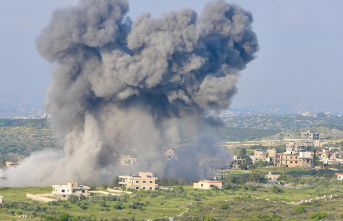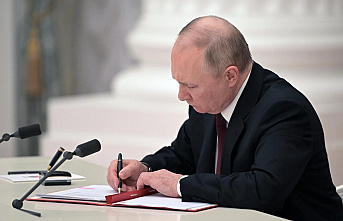Germany took the first major step to halt the certification of the Nord Stream 2 natural gas pipeline from Russia. This was a huge, lucrative deal that Moscow long wanted, but which was criticized by the U.S. as increasing Europe's dependence on Russian energy sources.
In Washington, President Joe Biden announced financial sanctions against banks and oligarchs in retaliation for what he called the "beginning of a Russian invasion" of Ukraine.
Biden stated that this meant we have cut off Russia from Western finance. "It cannot raise money from the West anymore and it can't trade in its new debt on our markets or European ones either."
Biden said that additional sanctions would be imposed if Putin continues to act.
The European Union announced sanctions against the 351 Duma legislators, 27 other Russian officials, and institutions of the defense and banking industries that voted for recognition of separatist areas in Ukraine. They also attempted to restrict Moscow's access EU capital and financial market.
After chairing a Paris meeting of EU foreign ministers, Josep Borrell stated that the sanctions package... would hurt Russia and will cause a lot of pain.
Ursula von der Leyen, President of the EU Commission, stated that "we will make it as difficult for the Kremlin's aggressive policies to continue,".
Boris Johnson, the British Prime Minister, named five Russian banks as well as three wealthy individuals who were sanctioned by the UK on Tuesday.
NATO chief Jens Stoltenberg said that if Putin presses into Ukraine, there will be stronger sanctions and a higher price to pay.
U.S. and other Western countries have been pressing daily for diplomatic efforts in order to avoid a dangerous military confrontation. The failure of this effort was highlighted Tuesday when Secretary of State Antony Blinken cancelled plans for a Thursday meeting with his Russian counterpart in Geneva. He said that Russia's actions had shown there was no point.
Since the West has long made it clear that Ukraine's fate must not be a direct military confrontation against Russia, and there is the possibility of a world-war, sanctions have been the only option.
Ingrida Simonyte, the Lithuanian Prime Minister, stated that there were no lows too low, nor lies too plaintive, and no red lines too crossed in summarizing the political dismay for Putin's actions expressed by countries from Europe to North America, and those who straddle Russia's borders in Asia, such as Japan or South Korea.
Putin continued to wreak havoc by using a strategy that has caused confusion over his intentions and potential actions.
Russia claimed it was sending "peacekeepers", but Borrell, the EU's foreign policy chief, said they were only "troops on sovereign Ukrainian territory."
Borrell stated, "I wouldn’t say that’s a fully fledged invasion, but Russian troops have been on Ukrainian soil."
British Defense Secretary Ben Wallace was not shy in his words. "Russia has already invaded Ukraine. They invaded Ukraine in 2014. In 2014, they illegally occupied Crimea and Donbas. Wallace stated that this is an additional invasion of their sovereign territories.
No matter what the title, the most recent developments were sufficient to put the 27-nation bloc in a state of high alert. The EU's foreign ministers highlighted that the US and other Western allies were closely involved in the announcements on Tuesday.
They did not reach the "massive” package that Washington and the EU threatened for a military invasion of national territory Kyiv still holds.
Simonyte stated, "The way that we respond will determine us for the generations ahead."
Johnson of Britain said that too much too quickly could harm the international response. He stated that this was the first tranche, or the first barrage, of the things we were prepared to do and that further sanctions are in place.
Jean-Yves Le Drian, French Foreign Minister, agreed that "This is a beginning." "We have more ammunition."
Biden appeared to have reserved some of the most severe and harshest penalties the United States could consider. These include an export ban to deny Russia U.S. technology for its military and industries, as well as more severe financial bans that could severely limit Russia's ability do business with the rest the world.
However, U.S. Secretary Of State Blinken stated that the announced sanctions are consistent with the "start high, keep high" approach.
Daleep Singh, White House deputy national security advisor, said that the initial sanctions sent the message that no Russian financial institution was safe if an invasion proceeds.
Singh stated, "No one should believe that it's our goal is to maximize sanctions." Sanctions are not a panacea. They have a greater purpose. That purpose is to prevent and deter.
Vnesheconombank (VEB), and Promsvyazbank Public Joint Stock Company, (PSB) are the two main Russian banks that have been targeted by U.S. sanctions. VEB is vital to Russia's ability raise funds. PSB is vital to Russia’s defense sector. They together hold assets worth more than $80 Billion and will be prevented from transacting in the U.S. or European banking systems.
After meeting with Blinken in Washington on Tuesday, Dymtro Kuleba, Ukraine's Foreign Minister, stated that U.S. and Western sanctions against Russia in increasing waves can work but he encouraged allies to be aggressive. Kuleba said that Putin shouldn't feel like sanctions have reached their limit at any one time.
Denis Bortnikov, a deputy president at Russian-state-owned VTB Bank, is one of the oligarchs and other close to Putin who are cited for sanctions. Petr Fradkov, Chairman and CEO of PSB, is another.
Aleksandr Bortnikov's father, a director of the Federal Security Service, and a permanent member of the Security Council of the Russian Federation was also listed in the sanctions lists. Fradkov is Mikhail Fradkov's son and former director of Russia’s foreign intelligence service.
Sergei Kiriyenko (Putin's first deputy chief-of-staff) and his son Vladimir Kiriyenko (CEO of Russia's largest social media platform VKontakte), were also named.
There are less chances of a major conflict being avoided, but hope is fading. Putin's directive was issued hours after recognizing the independence of two Ukrainian regions. It created Russian military support and angered Western leaders who consider his actions a breaching world order.
Putin blamed NATO for the current crisis, and called the U.S.-led NATO a threat to Russia.
This global condemnation was made amid rising skirmishes between Ukraine's eastern regions and Russia. These are alleged Russian attempts to use the region as a pretext for attacking the Europe-leaning democracy, which has been resisting Moscow's efforts to bring it back into its orbit.
The U.S. warned that Russia has already declared war on Ukraine with an estimated 150,000 Russian troops positioned on the three sides. In a desperate effort to avoid war, Biden and Putin agreed to a possible meeting that would be mediated by Emmanuel Macron, the French President.



